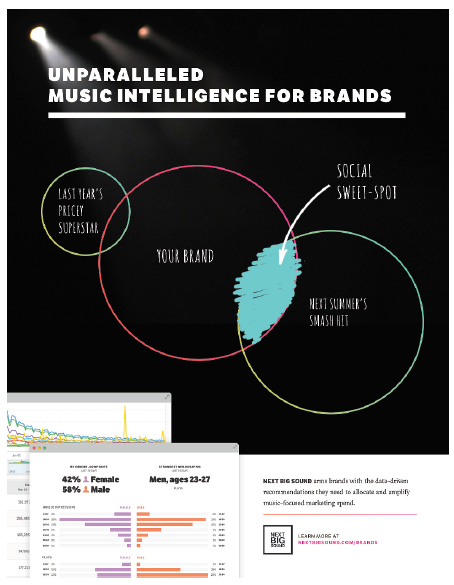1. Do you think that the technology available today reflects how people have always related to music?...
Question:
2. How can big data help artists, artist managers, concert promoters, and record labels make better decisions?
Until recently, only a few low-tech metrics were available to help record companies track the popularity of artists and songs. In the early part of the twentieth century, for example, sheet music sales were one indication of a song€™s popularity. By the 1950s, Billboard magazine€™s charts were tracking and reporting record sales. Of course, the charts only reported what people were buying, not how many times they listened to a particular song or artist. Later, Billboard added information reported by radio stations and jukebox owners to its charts.
In the new millennium, sales data tracked by Nielsen€™s SoundScan unit are still published each week in Billboard€™s charts, including the Hot 100. Some data is gathered from point-of-sale barcode scans of individual albums. Reports of radio play are another widely used measure, but it can take days or weeks for the information to become available.
Today, a typical album may generate as many as 4,000 separate lines of sales data. Media analytics€”including music as well as television, and movies€”is now a $3 billion global business. As Gregory Mead, CEO of a firm whose businesses include analytics, notes, €œFor a big artist like Katy Perry, there€™s about 19,000 different signals we have just for that artist. Each video, in each territory, on each platform, each release and each song and so on. No one€™s going to be able to look at that [by hand].€
Evidence of the increased importance of quantitative data comes from the recent spate of startups and acquisitions in the music industry. For example, Beats Music bought Topspin, a platform that connects artists with their fans; Apple, in turn, acquired Beats Music. Spotify, the music-streaming service that started in Sweden, acquired The Echo Nest, a so-called back end data provider whose service is designed to enhance the listeners€™ experience by helping them discover new music that they like as well as connect with older music.
€œArtists and managers are becoming like scientists, looking at lots of data.€
Next Big Sound
One company in the vanguard of the data analytics movement is Next Big Sound. As noted on its Web site, it offers €œIntuition, backed by intelligence.€ Forbes magazine has called Next Big Sound €œMoneyball for Music€; the reference is to a Hollywood movie about Billy Beane, the statistics-obsessed general manager of the Oakland A€™s baseball team. CEO Alex White founded Next Big Sound in 2009 during his senior year at Northwestern University. Today, Next Big Sound has partnerships with Spotify, Sony Music, and Universal Music Group, where White once interned.
Next Big Sound compiles music consumption data for nearly every recording artist in the world (see Exhibit 6-6). It tracks all major social media platforms, including Facebook, Twitter, YouTube, SoundCloud, Tumblr, and Instagram. Type in an artist€™s name, and Next Big Sound can tell you audience composition (proportion of males to females), audience reach and engagement, and the artist€™s €œsocial stage.€ For example, a 2015 query for Hiss Golden Messenger, an emerging artist, returns the following metrics:
€œModerate€ audience reach
€œStrong€ audience engagement
€œSlowing€ metric trend
€œUndiscovered€ artist social stage
By contrast, an established superstar such as Taylor Swift shows €œenormous€ audience reach (key metric: Instagram followers) and €œepic€ social stage. Moreover, White€™s company can tell Swift€™s record label, for example, how many million views her latest video has accumulated. White can also tell whether listeners, say, streamed music during the workweek but downloaded singles on the weekend. Such measures of fan interaction and engagement have not been available until recently.
Exhibit 6-6

Step by Step Answer:






